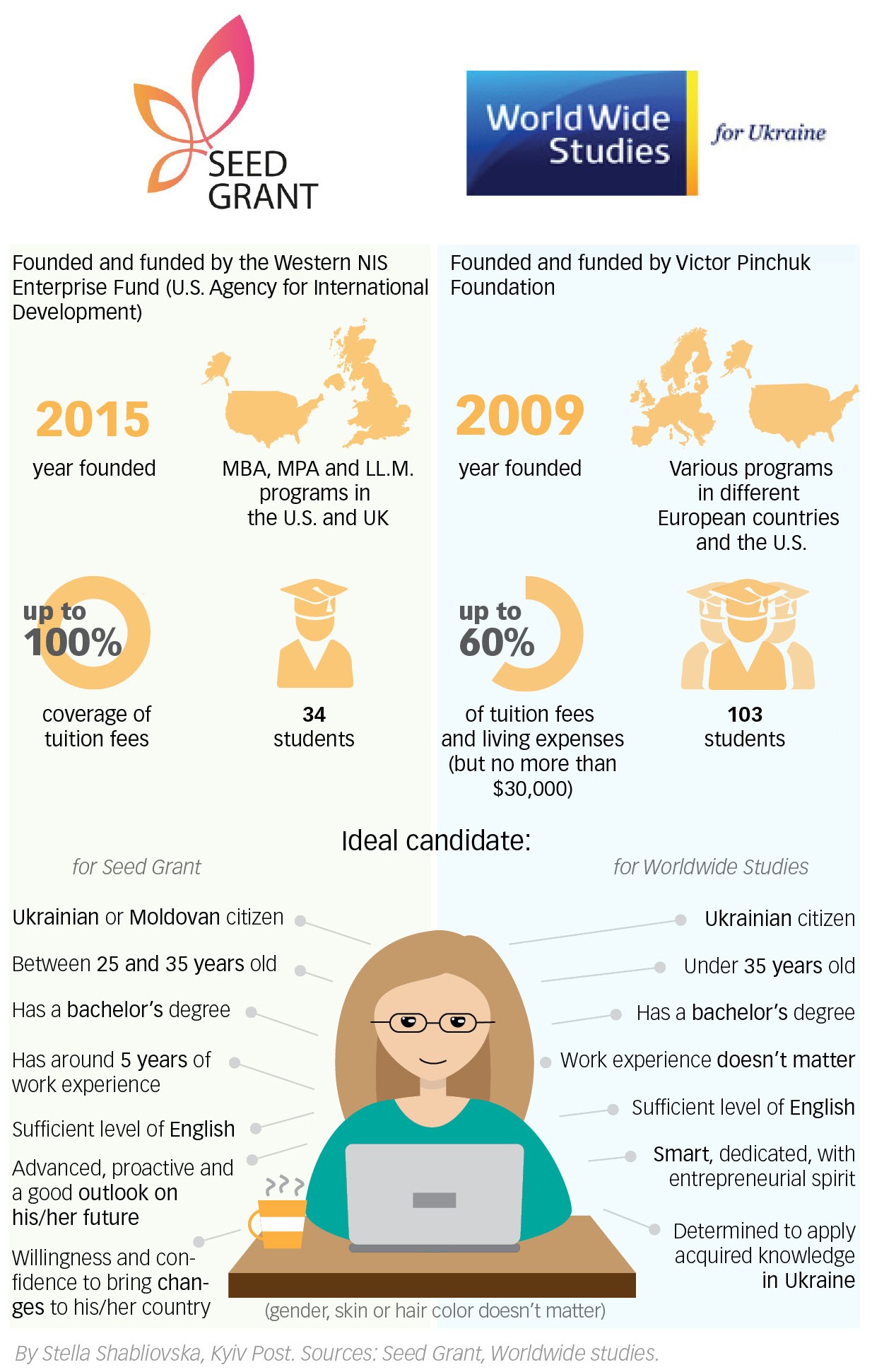Two dozen talented young Ukrainians will soon be heading off to the U.S. and European Union on scholarships to study for master’s degrees in subjects like business, agriculture and the rule of law.
This is possible thanks to two grant programs in Ukraine: Seed Grant and Worldwide Studies, which provide scholarships for high-achieving Ukrainians.
In June, both programs announced the winners of this year’s scholarships. Fifteen Seed Grant winners and nine Worldwide Studies winners got funding of up to $129,000 to cover post-graduate studies in the best Western colleges, including Columbia University, Stanford University, London School of Economics and Yale School of Management.
The main condition is that the scholars return home and apply their knowledge to help Ukraine prosper.
Despite similar demands, the two programs are different in origin.

Two programs, Seed Grant and Worldwide Students, have sent 137 students to study abroad at top universities, spending collectively more than $4 million on scholarships.
Seed Grant is operated and funded by Western NIS Enterprise Fund, a private equity fund, while the funding for tuition comes from the U.S. government through the United States Agency for International Development. It has given $2 million in scholarships to 34 students in Ukraine and Moldova since the launch in 2015.
The Worldwide Studies is funded by Victor Pinchuk Foundation, where the main sponsor is Ukrainian pipe and steel magnate Pinchuk. It has been active since 2010, having given scholarships to more than 100 Ukrainians.
For many recipients, the grants are once-in-a-lifetime opportunities not only to grow personally, but to change Ukraine.
Victoria Barbaniuk, who is one of two former Kyiv Post employees to receive both grants this year, says she sees it as an opportunity to transform Ukraine from within.
“One of my dreams is to come back to my hometown Kamianets-Podilsky and make changes there,” Barbaniuk says. “The city has great potential, but needs experienced managers to direct it in the right field.”
Worldwide Studies
Thomas Weihe, head of the board of the Victor Pinchuk Foundation, said a lot of care was taken in setting conditions. It took two years to develop the concept. The foundation is wary of making a mistake and giving money to people who don’t want to come back to Ukraine, or who can afford an education themselves.
Weihe recalls that there were two or three “black sheep,” scholars who failed to return to Ukraine.
Unlike Seed Grant, Worldwide Studies doesn’t only cover tuition fees, but some living expenses too, with up to 60 percent of overall expenses covered. However, the maximum grant is $30,000. The rest comes from the students themselves or other sources.
“Part of the reason why we ask them to find 40 percent from other sources is so we don’t have someone who is just smart, but not active or entrepreneurial enough to get the rest,” Weihe says.
Julia Lemesh, who got a master’s in law degree in banking and finance Law at Queen Mary University of London in 2010, says receiving the Worldwide Studies grant inspired her to help others. After returning to Ukraine, she became the founder of Ukraine Global Scholars, which raises money for scholarships.
“This knowledge helped me to view every problem from a more global angle: to use international resources as well as local ones,” Lemesh says.
Seed Grant
Seed Grant is different: It covers up to 100 percent of tuition fees from the fixed budget of $5 million, out of which it has spent $2 million so far.
The grant can be used to cover any of top 50 master of business administration programs in the United States, as well as a master of public administration and master of laws programs in the U.S. and the U.K.
Roman Cherepakha, who just got back from the U.S. after two years of studying at the University of Chicago Booth School of Business, says his Seed Grant came at the perfect time.
“I already had an offer from Chicago Booth and (this money) was just what I needed. I knew I would be coming back to Ukraine afterwards, because I’d rather build a hypothetical America in Ukraine than stay in America and do something there,” Cherepakha says.
Putting their knowledge to use in Ukraine is a requirement that Cherepakha never questioned. He was able to move up from being an analyst to becoming an investment director at Horizon Capital in Kyiv.
Anton Waschuk, economic leadership program coordinator at Western NIS Enterprise Fund, said candidates must have a clear vision of what they want to do when they come back to Ukraine.
“I’d say this is one of the best educational opportunities available in the world right now,” Waschuk says.
